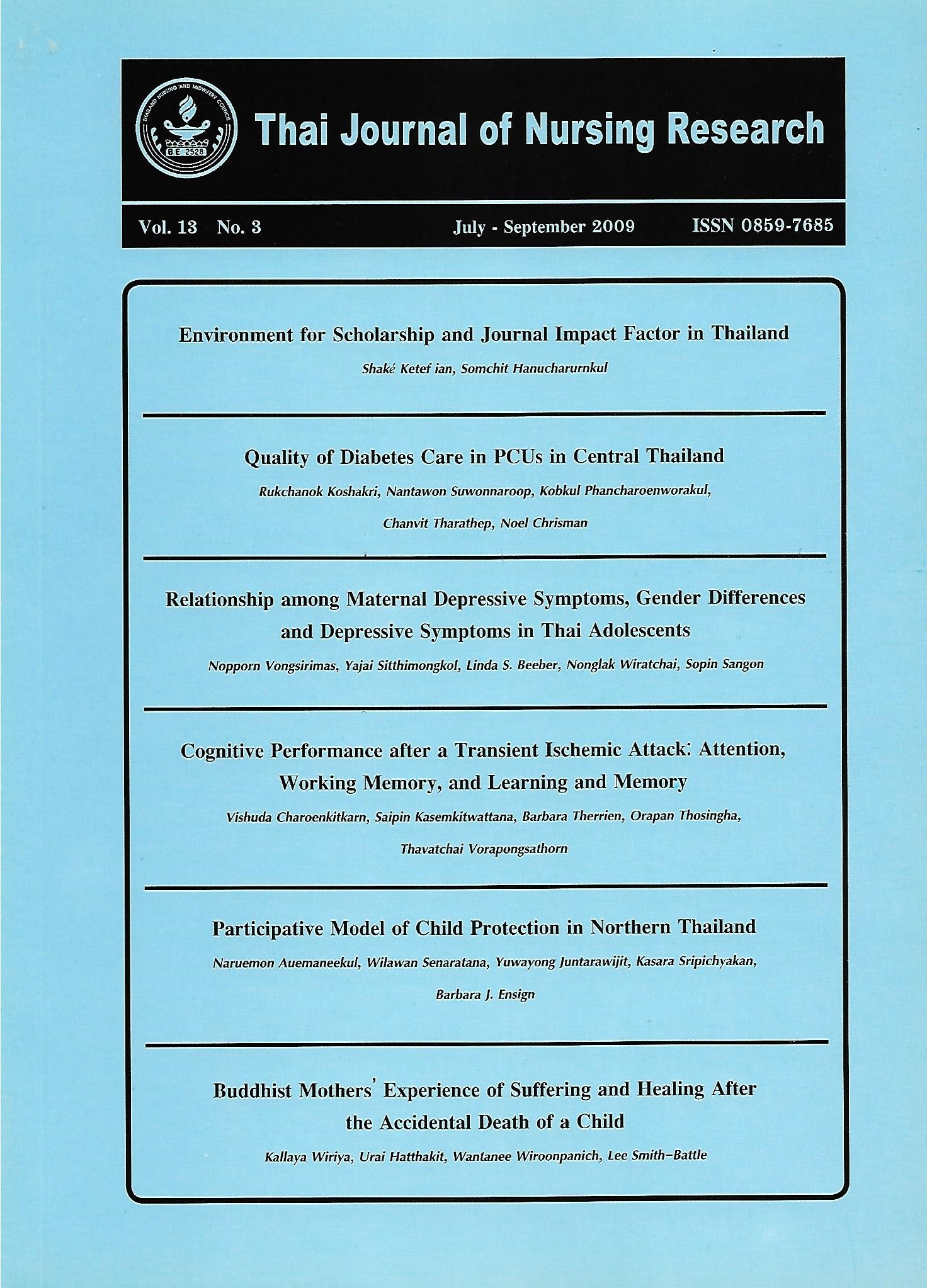Cognitive Performance after a Transient Ischemic Attack: Attention, Working Memory, and Learning and Memory
Keywords:
ประสิทธิภาพในการเรียนรู้จดจำ, ผู้ที่เคยมีอาการสมองขาดเลือดชั่วคราว, สมาธิ, กระบวนการจำ, การเรียนรู้และความจำ, attention, cognitive performance, learning and memory, transient ischemic attack, working memoryAbstract
บทคัดย่อ
การศึกษาไปข้างหน้า (prospective study) นี้มีวัตถุประสงค์เพื่อ ประเมินประสิทธิภาพการเรียนรู้จดจำ 3 ด้านหลัก ได้แก่ สมาธิ (attention) กระบวนการจำ (working memory) และการเรียนรู้และความจำ (learning and memory) ของผู้ที่มีอาการสมองขาดเลือดชั่วคราว (TIA) คัดเลือกกลุ่มตัวอย่างแบบสะดวก (convenient sampling) จากผู้ที่เคยมีอาการสมองขาดเลือดชั่วคราว 52 คน ที่มารับการรักษาที่หอผู้ป่วยนอกและหน่วยฉุกเฉิน จากโรงพยาบาลระดับตติยภูมิ 4 แห่ง ในประเทศไทย และผู้ที่เคยได้รับการผ่าตัดเล็ก (กลุ่มควบคุม) 52 คน จากผู้ที่มารับการรักษาที่หอผู้ป่วยนอก จากโรงพยาบาลระดับตติยภูมิ 1 แห่งในประเทศไทย
เครื่องมือที่ใช้ได้แก่ แบบทดสอบ Necker Cube Pattern Control, Trial A, Digit Span Forward, Barratt Impulsiveness Scale, Irritability Assessment Scale, Digit Symbol Substitution, Digit Span Backward, และ Hopkins Verbal Learning เก็บรวบรวมข้อมูลโดยการทดสอบและสัมภาษณ์ 3 ครั้ง ในวันที่ 3,10 และ 30 หลังจากมีอาการสมองขาดเลือดชั่วคราว วิเคราะห์ข้อมูลด้วยสถิติการวิเคราะห์ความแปรปรวนแบบวัดซ้ำ
ผลการวิจัยพบว่า ผู้ที่เคยมีอาการสมองขาดเลือดชั่วคราว มีสมาธิ กระบวนการจำและการเรียนรู้และความจำ เปลี่ยนแปลงในช่วง 30 วันหลังจากมีอาการสมองขาดเลือดชั่วคราว โดยประสิทธิภาพการเรียนรู้จดจำทั้ง 3 ด้านหลัก ต่ำกว่ากลุ่มควบคุมในวันที่ 3 หลังเกิดอาการสมองขาดเลือดชั่วคราว ยกเว้นเรื่องอารมณ์หงุดหงิด(Irritability) และมีประสิทธิภาพต่ำลงอีกในวันที่ 10 แต่ประสิทธิภาพนั้นกลับดีขึ้นในวันที่ 30 อย่างไรก็ตามประสิทธิภาพการเรียนรู้จดจำทั้ง 3 ด้านของกลุ่ม TIA ต่ำกว่ากลุ่มควบคุมทุกช่วงของการประเมิน
ข้อเสนอแนะจากผลการศึกษา พยาบาลและบุคลากรทางด้านสาธารณสุขควรตระหนักถึงความสามารถในการรับข้อมูลข่าวสารของผู้ที่เคยมีอาการสมองขาดเลือดชั่วคราว โดยเฉพาะวันที่ 10 หลังเกิดอาการ ผู้ป่วยอาจขาดสมาธิ ตัดสินใจเร็ว และความสามารถในการเรียนรู้และความจำลดลง ญาติควรมีส่วนช่วยในการรับฟังคำแนะนำจากทีมสุขภาพเพื่อช่วยดูแลผู้ป่วยให้ปฏิบัติตามแผนการรักษาต่อที่บ้านได้อย่างถูกต้อง
คำสำคัญ: ประสิทธิภาพในการเรียนรู้จดจำ ผู้ที่เคยมีอาการสมองขาดเลือดชั่วคราว สมาธิ กระบวนการจำ การเรียนรู้และความจำ
Abstract
This prospective study aimed to explore the three main areas of cognitive function (attention; working memory; and, learning and memory) among individuals who had experienced a transient ischemic attack (TIA). Convenience sampling was used to recruit 52 individuals, who had experienced a TIA, from outpatient and emergency departments in three tertiary hospitals, in Bangkok, and one tertiary hospital in Ayutthaya province, Thailand; as well as 52 persons, who had experienced minor surgery and served as matched control subjects, from the outpatient department at a tertiary hospital in Thailand. Subjects were assessed, 3, 10 and 30 days after experiencing a TIA or having minor surgery, using the Necker Cube Pattern Control Test, Trial Making A Test, Digit Span Forward and Backward Test, Barratt Impulsiveness Scale, Irritability Assessment Scale, Digit Symbol Substitution Test, and Hopkins Verbal Learning Test. A repeated-measures-within-and-across-subjects design was used to analyze the results.
Findings indicate that those who had a TIA continued to experience attention, working memory, and learning and memory changes, but not irritability changes, for over 30 days after symptom occurrence. Three days after symptom occurrence, those who had a TIA showed less ability in the 3 main cognitive performances than did the control group. Their performance ability became worse at day 10, but improved at day 30. All performances among those with a TIA were lower than the control group, at all three time points. Thus, nurses should be concerned about the cognitive ability of those who have had a TIA, as well as their respective families, and provide information to both about the effects of a TIA, particularly 10 days after symptom occurrence.
Key Words: attention, cognitive performance, learning and memory, transient ischemic attack, working memory
Downloads
How to Cite
Issue
Section
License
Copyright: The Pacific Rim International Journal of Nursing Research, Thailand Nursing & Midwifery Council has exclusive rights to publish, reproduce and distribute the manuscript and all contents therein.








.png)



